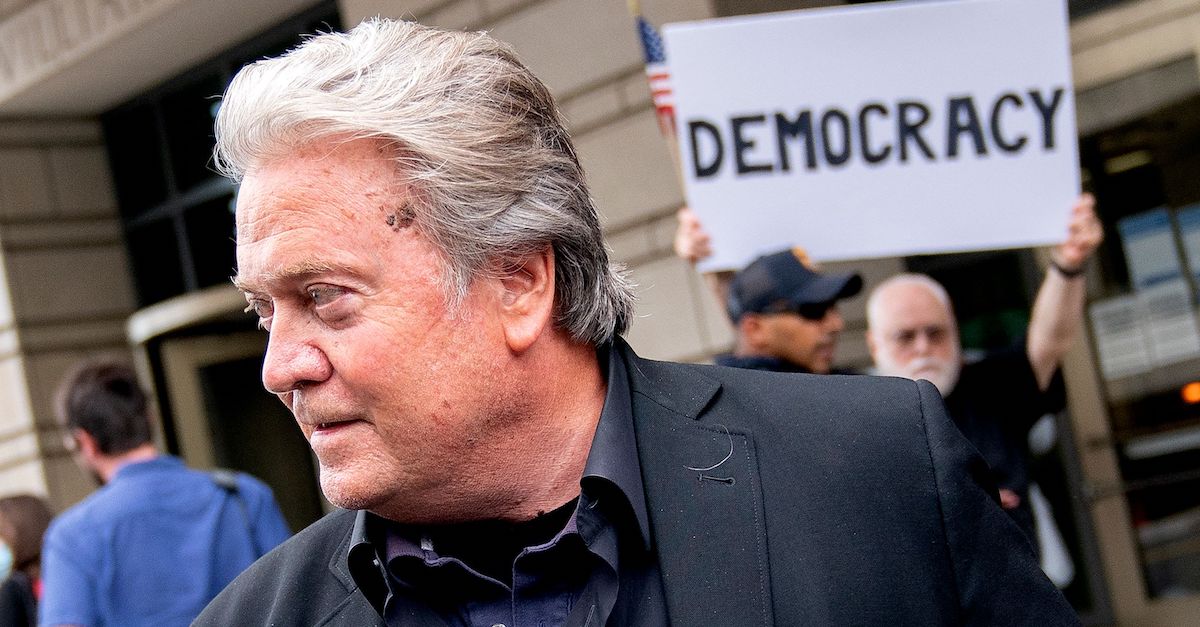
Former White House Chief Strategist Steve Bannon departs the United States District Court House on the first day of jury selection in his trial for contempt of Congress, in Washington, DC, on July 18, 2022.
Donald Trump’s ex-chief strategist Steve Bannon reportedly faces an indictment in Manhattan state court on allegations related to the federal border-wall charges that he dodged through the former president’s pardon.
The Washington Post reported that Bannon plans to surrender on Thursday.
A little more than two years ago in August 2020, the Southern District of New York charged Bannon and three other people with conspiring to defraud donors of the charity We Build the Wall and launder the money. Federal prosecutors said that Bannon pocketed about $1 million dollars, despite the charity’s promise to spend every dime on construction.
At the twilight of his presidency, Trump pardoned his ex-strategist Bannon — but not Bannon’s three erstwhile co-defendants, who did not serve in the administration. Two of those men, veteran Brian Kolfage and Bannon’s friend Andrew Badolato, ultimately pleaded guilty in April. The final accused co-conspirator, Timothy Shea, fought the allegations at a trial, where the jury ultimately deadlocked due to a lone holdout. Shea is awaiting retrial.
In a lengthy statement, Bannon attacked both his federal and state cases as political.
“The SDNY did the exact same thing in August 2020 to try to take me out of the election,” Bannon said. “It didn’t work then, it certainly won’t work now. This is nothing more than the partisan weaponization of the criminal justice system.”
At the time of Bannon’s federal indictment in the We Build the Wall case, the Department of Justice had been led by U.S. Attorney General Bill Barr, and SDNY had been led by U.S. Attorney Audrey Strauss, the successor of Trump appointee Geoffrey Berman.
The Manhattan District Attorney’s office is led by Alvin Bragg, a Democrat who faced criticism from the left after two of his prosecutors resigned, accusing Bragg of blinking on indicting Trump.
Bragg’s office reportedly has been making steady progress on investigating Bannon for more than a year. In February 2021, sources told CNN that the DA’s office subpoenaed records related to We Build the Wall.
Law&Crime legal analyst Julie Rendelman, a former Brooklyn homicide prosecutor, said that Trump’s pardon of Bannon left room for a state prosecution under the doctrine of separate sovereigns, which she did not believe would impute constitutional protections of double jeopardy.
“When Paul Manafort had state charges, those were thrown out, and there was a double jeopardy issue,” Rendelman noted.
Since that time, New York passed a law to plug what had been called the “double jeopardy loophole.” On top of a changed legal landscape, Bannon’s case would differ from Manafort’s in many important ways.
For one, Manafort’s case went to trial and ended in his conviction before Trump pardoned him.
“Bannon is different because he was pardoned before there was ever I don’t think there was ever a conviction,” Rendelman noted. “He was barely into the case when Trump pardoned him.”
Since Bannon’s federal case hadn’t gone to trial, his co-defendants received no clemency, and two men were ultimately convicted of the same conspiracy. Critics lambasted Trump’s pardon of Bannon at the time as a corrupt favor for a crony. It is unclear to what extent Bragg’s state case mirrors the former federal case, but the lengthy investigation suggests that the Manhattan DA’s indictment — which is not yet public — could break new ground.
If the charges are sufficiently different, Rendelman noted, that would also sink any double jeopardy argument Bannon might try to deploy.
Bragg’s office did not immediately respond to Law&Crime’s press inquiry.
Bannon is also awaiting sentencing in October, after a federal jury convicted him of unrelated contempt of Congress charges. The Trump loyalist defied the Jan. 6 Committee’s investigation into his role in the attack on the U.S. Capitol.
(Photo by STEFANI REYNOLDS/AFP via Getty Images)